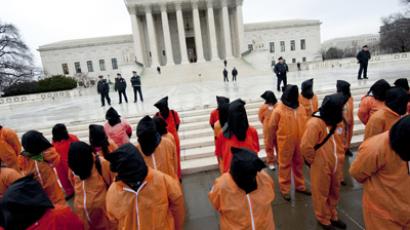California governor signs law defying cooperation with NDAA indefinite detention

California Governor Jerry Brown has signed a law barring state cooperation with any attempt by the federal government to indefinitely detain people. The legislation targets the 2012 National Defense Authorization Act (NDAA).
Brown signed into law AB351, which goes beyond any other state in rejecting federal indefinite detention power, according to the Tenth Amendment Center. The law reads, in part, “It is the policy of this state to refuse to provide material support for or to participate in any way with the implementation within this state of any federal law that purports to authorize indefinite detention of a person within California.”
The NDAA allows the US military to indefinitely detain anyone - sans charges or a trial - on the basis of “national security” concerns. The legislation has drawn a series of legal challenges and attempts in several states to limit its strength.
California’s new law not only targets the NDAA provisions, but also any future federal law that grants officials open-ended detention powers.
Though the NDAA has not been used to date, both administrations of Presidents Obama and George W. Bush have claimed power to detain indefinitely without charge “enemy combatants” caught in Iraq, Afghanistan, and around the world at Guantanamo Bay and other prisons.
In September, Pulitzer Prize-winning journalist Chris Hedges announced that he would be taking part in a federal lawsuit demanding the Supreme Court weigh in on the constitutionality of the NDAA provision allowing for indefinite detention.
That move was only the latest in a long legal saga following a legal victory with the appellate court of New York which last year declared Section 1021 of the NDAA unconstitutional. The Obama administration quickly appealed that ruling, and in July it was overturned.
Hedges, who says he has illegally been held by the US government numerous times during his career as a foreign correspondent, wrote that the appellate court overturned the initial victory against the NDAA because “with respect to citizens, lawful resident aliens, or individuals captured or arrested in the United States, Section 1021 simply says nothing at all.”
“The court, in essence, said that because it did not construe the law as applying to US citizens and lawful residents we could not bring the case to court,” Hedges wrote in his September op-ed.
Hedges pointed out that the Supreme Court may never hear the case, as it receives some 8,000 requests each year. Out of those, it only hears between 80 and 100.
California’s move against indefinite detention powers, however, marks a continuing trend among individual states.
Last year, Virginia signed a bill into law prohibiting state cooperation with federal government attempts at indefinite detention. The state of Alaska then passed a similar bill.














